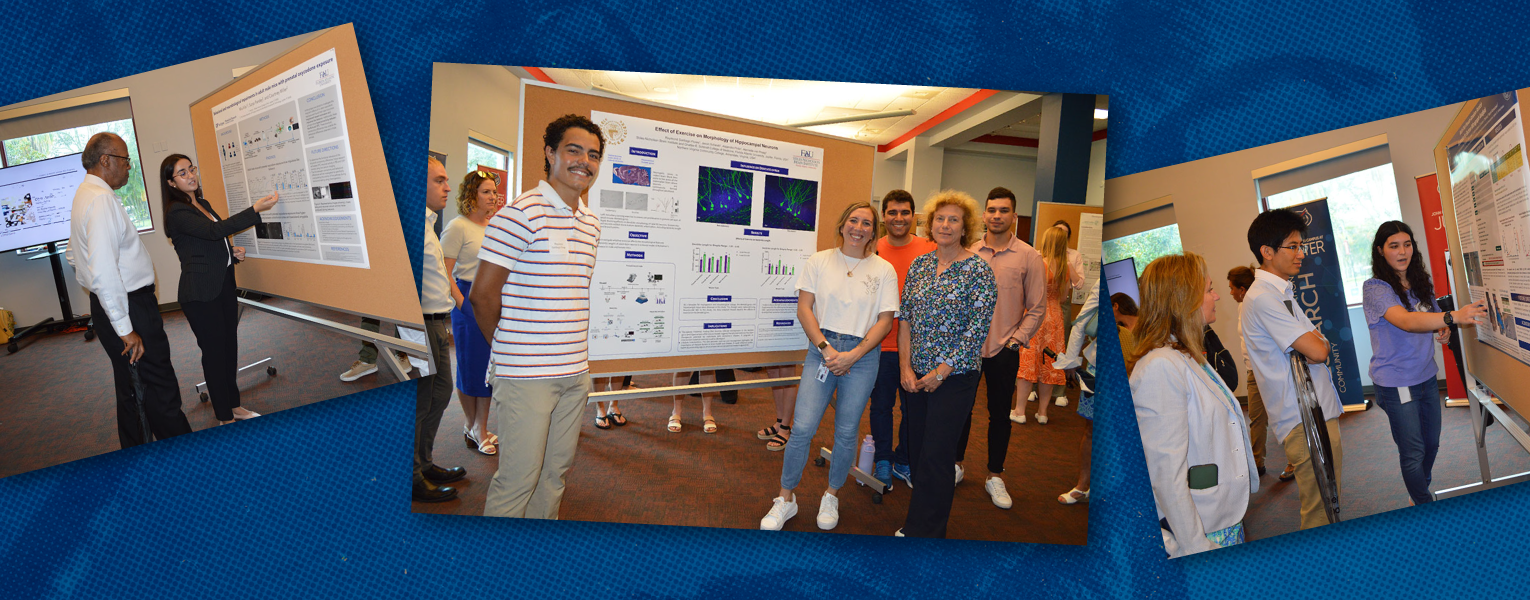8/14/2023
Summer Sign Off
Student Research Fellows Present at Symposium
By Chelsey Matheson
The National Science Foundation (NSF) Summer Intensive Neuroscience Experiences (SINE) at FAU’s John D. MacArthur Campus in Jupiter recently culminated with a student research poster symposium.
NSF SINE (also known as NSF Summer Research Experiences for Undergraduates, or REU) is an intensive 10-week program where undergraduate students from across the country come to FAU Jupiter to participate in cutting-edge neuroscience research.
The Summer 2023 cohort at FAU Jupiter consisted of 12 student researchers, including undergraduates from FAU, Rowan University in New Jersey, University of Puerto Rico, Northern Virginia Community College and Belmont University in Tennessee, as well as two students from FAU High School – Jupiter Campus in partnership with Max Planck Academy. They were hosted by laboratories at FAU Stiles-Nicholson Brain Institute, the Harriet L. Wilkes Honors College at FAU, Max Planck Florida Institute for Neuroscience, and the Herbert Wertheim UF Scripps Institute for Biomedical Innovation & Technology.
During the symposium, the students presented their findings to a crowd of scientists, professors, community leaders, fellow students and supportive friends and family.
Our students were hosted by labs at FAU Jupiter. Juliana Saez (Rowan University), Joel Edouard (FAU) and Raymond Santiago Flores (Northern Virginia Community College) conducted their research in labs at the Stiles-Nicholson Brain Institute.
- Edouard worked in the lab of Qi Zhang, Ph.D., where he investigated brain cholesterol regulation using an unorthodox Alzheimer’s disease model.
- In the lab of Henriette van Praag, Ph.D., Santiago Flores participated in a study of the effect of exercise on the structure of hippocampus neurons.
- Saez worked in the lab of Ning Quan, Ph.D., where she studied cytokine interleukin-1β (IL-1β), a protein that helps mediate inflammation in the central nervous system.
- Daniela Umana Rodriguez (University of Puerto Rico) worked in the lab of Erik Duboue, Ph.D., an associate professor of biology in the Wilkes Honors College, where she compared the eating habits of surface and cave-dwelling fish to understand underlying functional and evolutionary principles in dietary behaviors.
Rebecca Dicicco (FAU), Zoe Niesen (Belmont University), Avinash Kanakam (FAU) and Ohm Parikh (FAU) were hosted by labs at Max Planck Florida.
- Mariam Rizvi and Mila Vila (both FAU) studied in labs at the Herbert Wertheim UF Scripps Institute. Their projects investigated topics including the effects of temperature on aging, neurological processes involved in feeling hunger, and the neurological impacts of prescription opioid use during pregnancy.
The two FAU High students were also hosted by labs at Max Planck Florida. Amanda Grodman worked in the lab of Naomi Kamasawa, Ph.D., where she studied advanced electron microscopy techniques using freeze fracture replica immunogold labeling to expose cellular intermembrane proteins. Addison Manofsky was hosted by Yingxue Wang, Ph.D., where she investigated a novel approach to two-photon calcium imaging to classify regions of interest in the hippocampus. They were both supported by MaryLynn Magar Fellowships. Magar, a former member of the Florida House of Representative and longtime supporter of science education and biomedical research, was on-hand at the event to meet them and hear about their studies.
Edouard, Dicicco, Rizvi, Vila and Parikh were supported by the John Nambu Memorial Summer Research Experience for Undergraduates fellowship. John Nambu, Ph.D., was an FAU faculty member and a mentor and researcher at Max Planck Florida.
Kanakam was also supported by a memorial fellowship named for a former FAU professor, Jeffrey S. Morton, Ph.D., a professor of political science and Foreign Policy Association fellow. The annual fellowship is granted through the Wilkes Honors College.
If you would like more information, please contact us at dorcommunications@fau.edu.
